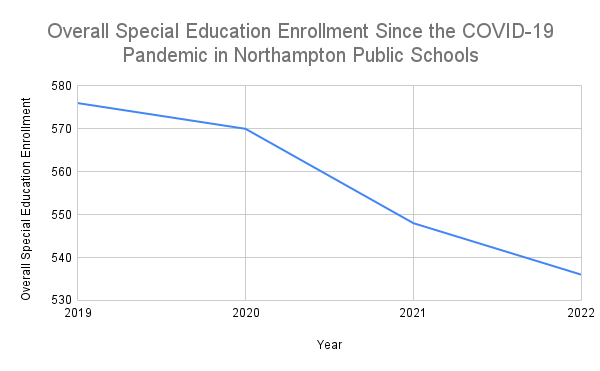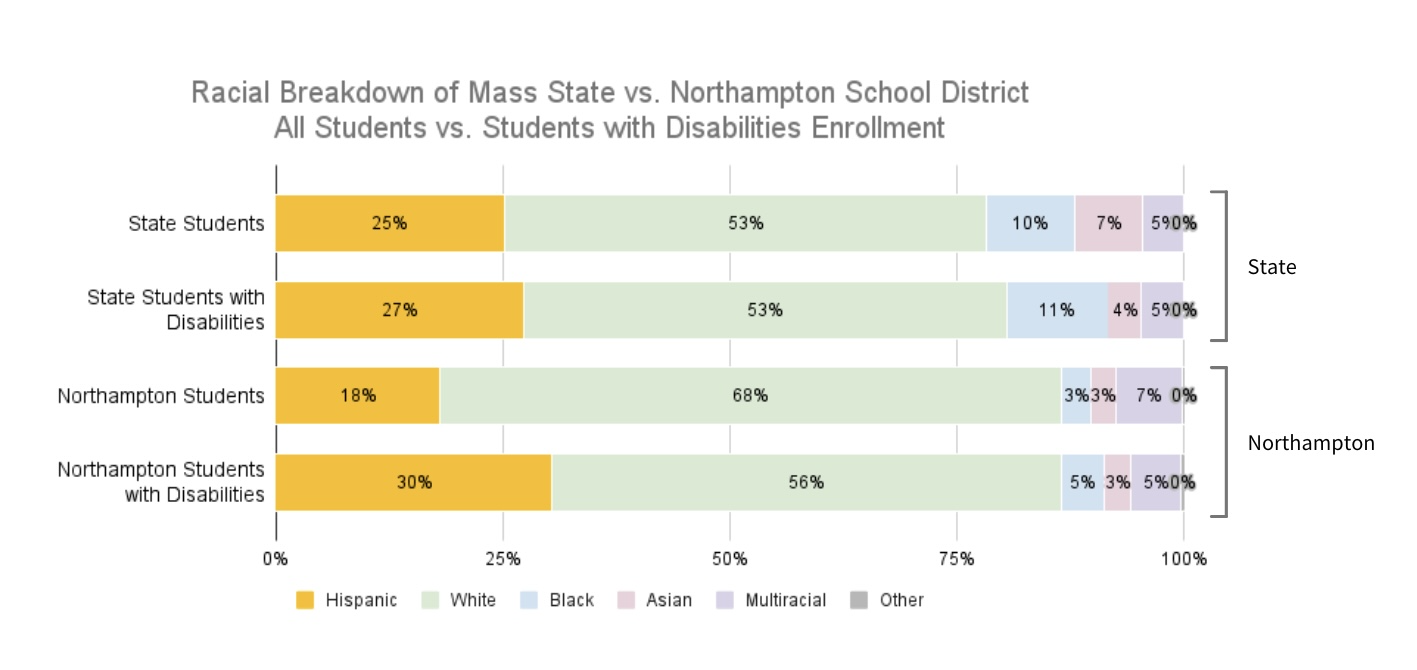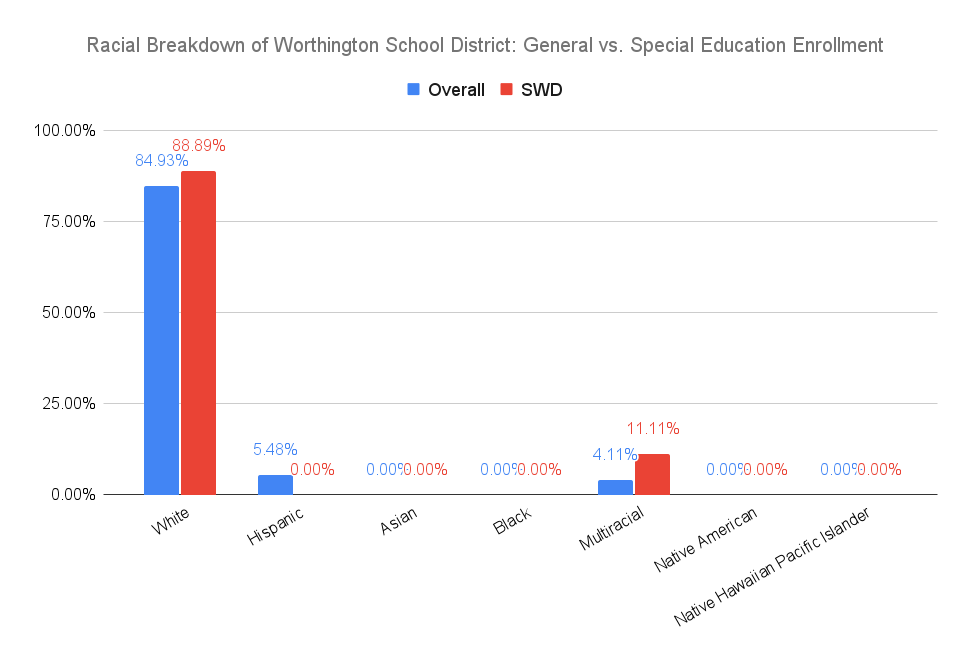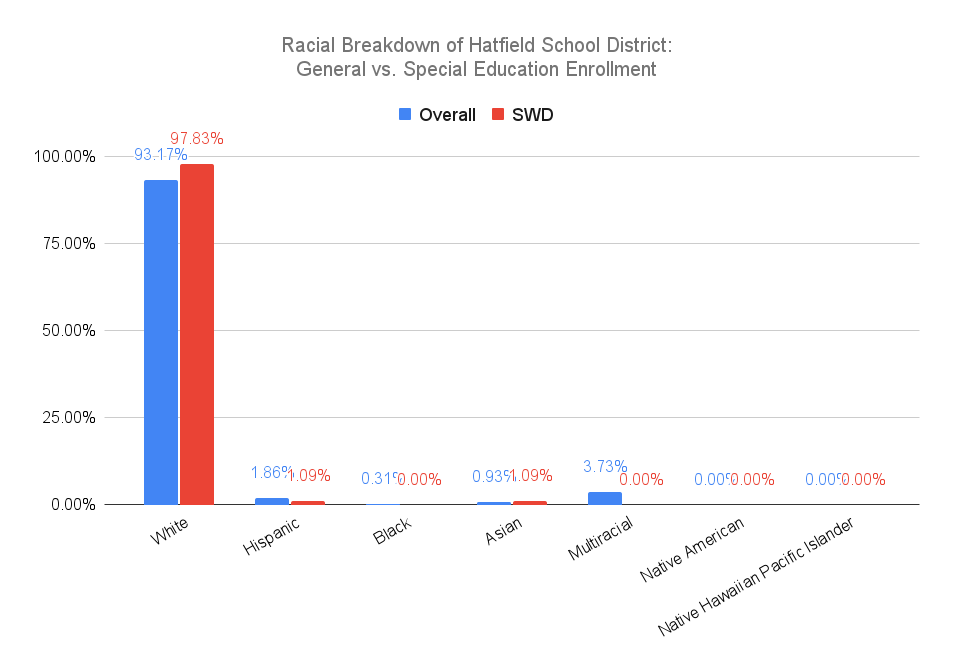Racial disparities in special education enrollment, especially among Hispanic students in Northampton Public Schools, reveal deeper problems with how students with different needs are identified and supported. Ana Soler, who came from Colombia to the United States at the age of fourteen, is now the executive director of the National Association of Educational Translators and Interpreters of Spoken Languages (NAETISL) and is completing a doctoral degree in special education. When talking about the special education evaluation form, she said, “A lot of these assessments are not culturally appropriate.”
Educators worry that the lack of funding is contributing to many Hispanic students being placed into special education programs, not because of a disability, but because no one recognized that they were simply struggling to learn English as a new language. “Sometimes it can be hard to tease out is this a language learning skill that they are lacking or is this a learning disability….I can imagine that we have a higher ratio of students that identified as Latina or Latino here than a lot of other groups…..If we have a hard time teasing that out, we are not gonna say no to help a kid.” Sara Churchill, SE Coordinator and Evaluation Team Leader at JFK Middle School, said. As the district grapples with funding special education services in a post-pandemic world where costs are rising but enrollment is not, one pressing question looms: How can Northampton ensure that students aren’t misplaced — and that every child receives the support they truly need and deserve?

Limited Resources in a Hard Time
The overrepresentation of Hispanic students in special education programs in the Northampton school district is striking compared to the statewide situation.
According to a study by the U.S. Government Accountability Office, more than 20% of K-12 English learners in Massachusetts have disabilities. Non-native English-speaking students are particularly overrepresented in “subjective” categories—such as learning disabilities, intellectual disabilities, and emotional disturbance—according to a report by Caroline Parker for the Massachusetts Department of Education.
Not all minority groups face the same challenges – for native speakers, language barriers may not be a confounding factor in evaluation for special education. “The typical African American student only speaks English, so you can alleviate the EL addition. So I can see why that category wouldn’t be overinflated.” Churchill noted.
Beyond misidentification, limited resources in Northampton’s public schools make it difficult to support struggling students before they are placed in special education.
Kira Henninger, a school psychologist at Leeds Elementary School, highlighted that Northampton faces a $4.8 million budget deficit, forcing difficult decisions on resource allocation. This deficit has grown compared to the $2.8 million estimated budget gap in the 2023-24 school year.

Henninger explained that special education is mandated by law, so funding must go there first and they have to make hard choices: “We want to put our time and resources more in the prevention and early intervention stage, and that makes it really hard when we are not able to provide general education supports.”
Budget constraints have led to severe staffing cuts, further limiting support for struggling students. According to Churchill, JFK Middle School alone lost 22 staff members last year, including clerical and special education staff. Henninger added that Northampton’s school district is expected to eliminate 20 more positions this year, despite a $3 million budget increase—which still falls short of closing the deficit.

For many Hispanic families, the special education evaluation process can be stressful and confusing, particularly for non-native English speakers. “Special education looks very different in our countries.” Soler said, “When we mention special education to parents, they need more information to understand what it’s really like and how they can support their children.” Henninger also noted that parents often worry about the long-term implications of a disability diagnosis and whether it will limit their child’s future opportunities.
Parents fear the stigma attached to special education, Henniger said. She added that they work hard to communicate with families in their native language and reassure them that these services are here to help. However, if more resources are not put into working with these families and the overrepresentation continues, “teachers tend to start having different perceptions of the children who speak other languages because they have something ‘missing’.” Soler noted.
Some students also face challenges navigating cultural expectations, especially when their home environments reflect different traditions. According to Lauren Barry, Family-Student Engagement & English Learner Education Coordinator for Northampton Public Schools, “those things [using language socially] that students may not pick up on or understand because it is based and rooted in the culture of that language…we are teaching them about academics and we are also teaching them on how to use that language in different contexts.”
Recently, some students have expressed concerns about whether they can learn in a safe and supportive environment, given recent events related to immigration. According to Lauren Barry, “some students, as of late, have had a lot of real fears and [we are] trying to assure them that when they are with us, … we provide a safe place for them to come and learn regardless of who they are related to status here.”
Efforts Are Being Made
Despite these challenges, Northampton’s special education teams are implementing preventative measures to better support students before they require a disability diagnosis.
Clara McCoy, a school psychologist at Leeds Elementary School, stressed that early intervention is key. “The reason we want to invest so much in the preventive level of support is because we know that if you get support to students early, they will not end up expressing a disability sometimes.” Making early intervention is not only good for the children, but also helps the system save money and resources. “When you are not able to do that [early intervention], what happens is you have kids who otherwise might not have needed to be in special education or be identified with a disability, who then end up have to be identified with a disability, or expressing a disability, which makes it more expensive or more resource-intensive down the line. So it can be a problem that snowballs.” McCoy added.
Northampton public schools employ specialized staff, including speech and language pathologists, to address language-related learning difficulties. According to Lauren Barry, the school district uses a sheltered English immersion program—where students receive general education instruction in English to accelerate language proficiency—there are also policies in place to ensure students receive support in their native languages as they adjust to their new routines. She said, “If students are typical, this is what they can typically do in their native language. But if there’s indicators that they potentially could be struggling in their native language and learning a second language, … you are going to go through our SST process, which is a support team and referral process, and then if it is still challenging, … bilingual evaluators do an evaluation and decide which parts of that measurement to do in a student’s native language and to assess in English.”
Leeds Elementary School collaborates with Northampton Area Pediatrics to offer parent-led workshops on anxiety and an ADHD support group, helping families navigate challenges. According to the official website for Northampton Area Pediatrics, workshops are held monthly during the school year.
For language difficulties, the school employs translators to communicate effectively with parents of students with disabilities who are non-native English speakers, translating documents into their native languages to clearly convey their children’s progress and ensure they receive necessary support. Additionally, Rebel McKinley, the special education coordinator at Leeds Elementary, noted that the school collaborates with bilingual evaluators to differentiate between language-related struggles and actual disabilities, a distinction that can be especially difficult for young children under 9.
While the overrepresentation of Hispanic students in special education in Northampton raises serious concerns, this pattern is not universal across Hampshire County. In fact, many nearby districts do not exhibit the same disparities, largely because they serve student populations that are far less diverse.
These districts do not show the same overrepresentation of Hispanic students in special education as Northampton; however, with such a limited number of Hispanic students, it is difficult to determine whether misidentification due to language barriers exists and, if so, what the underlying causes might be.
This can create a misleading perception that misidentification is not a widespread issue, when in reality, it is a problem that becomes visible primarily in districts with more diverse student bodies like Northampton. Ultimately, while Northampton’s situation is troubling, it also reflects the growing pains of a district that has long been diverse and continues to grow more so each year –without the necessary funding or staffing to fully support it. Other districts in Hampshire County may not show the same statistical disparities, but that is not necessarily a sign of a better system; rather, it may point to the lack of diversity that masks similar systemic challenges.
Budget Strain and Staff Burnout
Funding cuts and layoffs have caused emotional and mental strain among workers in special education who are trying their best to support students with different needs and backgrounds. “Mentally, it’s exhausting for special education teachers and staff…We do the best we can with what we have…It can feel frustrating that we are not able to do more,” emphasized Henninger. Without proper support, children may not only be misplaced into special education programs but also miss other opportunities to excel in their academic careers. “Hispanic students are being referred to special education and not being referred to programs like gifted education,” said Ana Soler.
While the special education coordinators and teachers are aware of the misplacement issue and are making a conscious effort to improve the evaluation process and provide preventive measures, the challenges faced by students and educators will only intensify without sustained investment. Ultimately, the funding crisis threatens not only the academic success of students with disabilities but also the ability to provide equitable education for all students in Northampton.
References
Enrollment Data (2023–24) - Massachusetts (00000000). (2024). Department of Elementary and Secondary Education School and District Profiles. Retrieved March 29, 2025, from https://profiles.doe.mass.edu/profiles/student.aspx?orgcode=00000000&fycode=2024
Granberry, P., & Agarwal, V. (2022). Latinos with Disability in Massachusetts. Gastón Institute Publications, 293. https://scholarworks.umb.edu/gaston_pubs/293
Northampton - Special Education Data (2023–24) - Northampton (02100000). (2024). Department of Elementary and Secondary Education School and District Profiles. Retrieved March 29, 2025, from https://profiles.doe.mass.edu/gis/sped_map.aspx?orgcode=02100000&
U.S. Government Accountability Office. (2024, May 15). K–12 education: How states identify English learners, including those with disabilities. https://www.gao.gov/products/gao-24-107376
Paleologopoulos, J. (2024, April 15). Facing potential cuts, Northampton school committee ends up adding to budget proposal. WAMC Northeast Public Radio. https://www.wamc.org/news/2024-07-03/northampton-city-council-approves-school-budget-amid-concerns-over-cuts
Paleologopoulos, J. (2024, July 3). Northampton City Council approves school budget amid concerns over cuts. WAMC Northeast Public Radio. https://www.wamc.org/news/2024-07-03/northampton-city-council-approves-school-budget-amid-concerns-over-cuts
Parent Workshop Series. (n.d.). Northampton Area Pediatrics, LLP. Retrieved March 29, 2025, from https://www.napeds.com/workshops-and-events/patient-workshop-series/
Parker, C. E. (2012, November). English Language Learners with Disabilities in Massachusetts: Current Status and Next Steps for Identification and Instruction. Education Development Center, Inc. https://files.eric.ed.gov/fulltext/ED565778.pdf



